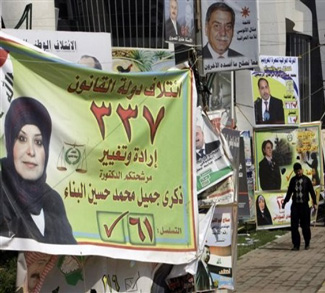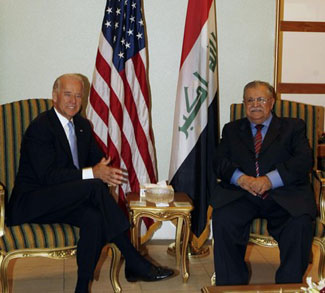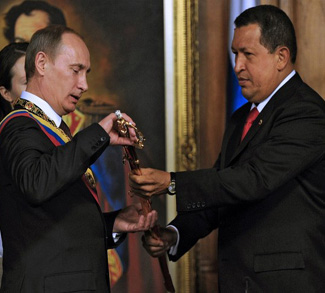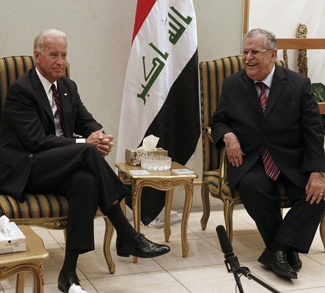FORECAST
As the global media narrows its collective focus onto NATO’s struggle to re-take Afghanistan, sectarian tensions are threatening to rip apart the political fabric of Iraq.
Broadly speaking, America’s Iraq policy hinges on various political benchmarks materializing before a large scale troop pullout can occur. These benchmarks include: evidence of Sunni-Shiite reconciliation, a political solution to Kurdish regionalism, an equitable distribution of oil wealth, and the development of a national security apparatus that is both effective and representative. To many in Washington, this year’s parliamentary elections were to be the point that many of these goals had been realized.
It is now clear that this is not the case, and President Obama will consequently be compelled to extend the American deployment since the Status of Forces Agreement deadline for a full withdrawal will come and go without political stabilization. The lead-up and aftermath of next week’s elections will influence the size of this deployment and the length of its stay.
As for the elections themselves, it has become clear that they will do little to bridge the sectarian divide in the country.
Sunni-Shiite relations have been taking a turn for the worse as of late, due in no small part to the political machinations of the de-Baathification board; a subset of the Iraq Elections Committee that has continued the work started by Paul Bremer and the Coalition Provisional Authority. The board recently banned over 500 politicians from standing in next week’s elections under suspicion of links to Saddam Hussein’s Baath Party. The vast majority of these politicians are Sunni, leading some to infer that ‘de-Baathification’ has turned into ‘de-Sunnification.’
Even though these moves have yet to elicit a widespread Sunni boycott of the March 7th elections, they have definitely tilted the balance in favor of Shiite political parties. Since the next parliament could implement changes to the Iraqi constitution, this short-term political alienation has the potential to translate into a more permanent disenfranchisement; a prospect that suggests spiking sectarian violence and civil war in the future.
Foreign money in the political process is also emerging as an impediment to long-term reconciliation in Iraq. Suspicion is rife that money from neighboring powers such as Iran and Saudi Arabia is driving the electoral campaigns of certain sympathetic political parties. The former Iraqi Prime Minister Iyad Allawi recently came under fire for visiting Saudi Arabia ahead of next week’s elections. Prime Minister Nouri al-Maliki’s State of Law coalition has accused Allawi, a Shiite, of seeking to alleviate Saudi fears of Iranian influence in return for money to run his electoral campaign.
This kind of foreign meddling in Iraqi politics does not bode well in the event of a return to open sectarian bloodshed. Foreign patronage of feuding political blocs is a dynamic that has launched several civil wars in the past.
Of course, the Kirkuk crisis and Kurdish regionalism also looms as yet another flashpoint for conflict, and there is no reason to believe that next week’s elections will produce a settlement.
With the aforementioned conflicts continuing to simmer in Iraqi politics, it follows that President Obama will soon be forced to break another campaign promise by negotiating an extended stay for US troops in Iraq. Even if next week’s elections come and go without any major sectarian attacks, the presence of US troops on Iraqi soil may just be the only thing forestalling an Iraqi civil war.
SUMMARY OF EVENTS: February 22nd – March 1st, 2010
NORTH AMERICA
Cuba
Cuba’s leader Raul Castro “laments” the death of a detained activist who had been on hunger strike for nearly three months, its foreign ministry says.
United States
The role of Wall Street firms in deals that may have helped Greece mask its debt woes are under scrutiny in the US, the Federal Reserve chief has said.
WESTERN EUROPE
Turkey
Turkey’s president has said tensions over an alleged military coup plot will be resolved within the law, after meeting the head of the armed forces.
Greece
Police in Greece have clashed with protesters striking over austerity measures designed to save the economy.
MIDDLE EAST
Yemen
The United States plans to provide Yemen with helicopters, transport equipment and training to expand its air and ground offensive against al Qaeda, a Pentagon document showed on Thursday.
U.S. spy agencies believe an American-born Muslim cleric based in Yemen played a bigger role than first thought in al Qaeda in the Arabian Peninsula‘s decision to start launching attacks against U.S. targets, counterterrorism officials said.
Israel
Israeli Prime Minister Benjamin Netanyahu met members of a hit squad at Mossad headquarters shortly before they went to Dubai to kill a Hamas commander, Britain’s Sunday Times newspaper reported.
Israel’s prime minister has announced a controversial plan to add two major religious sites in the West Bank to the country’s national heritage list.
Israeli opposition leader Tzipi Livni has applauded the controversial killing of a Hamas commander in a Dubai hotel by suspected Israeli agents.
Dubai
Investigators in the United Arab Emirates (UAE) say they have identified 15 more suspects in the assassination of a Hamas official at a Dubai luxury hotel last month.
Iran
Iraq’s top Shia cleric Grand Ayatollah Ali al-Sistani has issued a Fatwa (religious ruling), declaring vote-buying as Haraam (forbidden) ahead of the country’s parliament elections.
A Russian official has indicated that Moscow could support new sanctions against Iran over its nuclear programme, but not ones as severe as Western countries and Israel are seeking.
SOUTH ASIA
Afghanistan
A roadside bomb has killed 11 civilians in southern Afghanistan’s Helmand province, officials say.
At least 15 people have died after a suicide bomber blew himself up among a tribal leaders and government officials meeting recently returned Afghan refugees in eastern Nangarhar province.
US-led forces fighting to clear a Taliban stronghold in south Afghanistan are making “steady progress”, the US’ most senior US military commander says.
The current offensive around the southern Afghan town of Marjah is the initial operation of a long campaign, the head of US Central Command says.
Pakistan
Pakistan’s latest moves against Taliban fighters on their territory have been hailed by the United States, but others have questioned whether the increased co-operation is a ploy by Islamabad to assert its position as a key player in negotiations with the movement.
The recent arrests of Afghan Taliban leaders in Pakistan were the result of intelligence breakthroughs and none was involved in reconciliation talks with the Afghan government, the U.S. general who oversees the war in Afghanistan said Tuesday.
A top Al-Qaeda operative Qazi Zafar suspected of being involved in the US consulate Karachi bombing has been killed in a US drone strike in Dandi Darpakhel village near North Waziristan’s main town of Miramshah on Wednesday.
EAST ASIA
Phillipines
Islamist militants have attacked a village in the southern Philippines, killing at least 11 people, military officials have said.
China
Beijing has delayed some high-level military visits to the US in retaliation for Washington’s proposed arms deal with Taiwan, Pentagon officials said on Tuesday.
Investigators say they are closing in on the source of the cyber attacks that hit a number of US companies, including Google, according to reports.
China has not called off any military exchanges with the U.S. following a major U.S. arms sale to Taiwan last month, and unless Beijing signals otherwise, Defense Secretary Robert Gates says he will continue with a planned visit later this year.
Brazil, Russia, India and China will seek to expand coordination beyond the economic realm at their second summit slated for April.
AFRICA
Somalia
Al-Shabab, the Somali Islamist opposition group, has announced it will stop World Food Programme (WFP) operations in Somalia.
Amnesty International is calling for the immediate release of a Somali radio journalist held by the armed group al-Shabab, apparently after a report was broadcast alleging the group had killed a man in the Wanleweyn district.
Hizbul Islam announces end of alliance with al-Qaida-linked al-Shabab insurgents; civilians brace for clashes as hundreds flee Mogadishu ahead of government offensive.
Niger
The leaders of the military coup in Niger have promised a “return to constitutional order”, three days after overthrowing President Mamadou Tandja.
Sudan
Sudanese President Omar al-Bashir has signed a framework ceasefire deal with one of Darfur’s main rebel groups, the Justice and Equality Movement (Jem).
OCEANA
Australia
Australian Prime Minister Kevin Rudd has warned that his country is now under a permanent and increased threat of militant attack.




